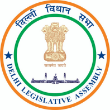LEGISLATION
The act of making laws is legislation. A Bill is a draft of a legislative proposal. It has to pass through various stages before it becomes an Act.
First Reading:
- The legislative process starts with the introduction of a Bill. A Bill can be introduced either by a Minister or by a private member. (A member of the house, who is not a minister, is called a private member). A Bill introduced by a Minister is called a Government Bill and a Bill introduced by a private member is known as a Private Member’s Bill.
- On the day, the Bill is listed for introduction; the Minister or member in-charge of the Bill has to seek the leave (permission) of the House to introduce the Bill. If the House grants leave the Bill is introduced. This stage is known as the first reading. The Motion for introduction of a Bill can be opposed at the introduction stage. However there have not been any instances of such opposition at the introduction stage in the Delhi Assembly.
- After a Bill has been introduced, it is published in the Gazette. Even before introduction, the Speaker may, if he deems fit and if a request to this effect has been received, direct that the Bill be published in the Gazette. (Rule 118). In such cases, leave to introduce the Bill in the House is not asked for and the Bill can be straightaway introduced.
- A Minister desiring to move for leave to introduce a Bill has to give the notice in writing to the Assembly Secretary at least seven days in advance. Similarly, in cases of Private Member’s Bill, the notice period is 12 days. However, Speaker can, if he deems fit, allow the introduction at a shorter notice.
- Special Provisions as to Financial Bills: Section 22 of “The Government of National Capital Territory of Delhi, Act, 1991” lays down that a Bill or amendment cannot be introduced except on the recommendation of the Lieutenant Governor if such Bill or amendment makes provision for any of the following matters:
- the imposition, abolition, remission, alteration or regulation of any tax ;
- the amendment of the law with respect to any financial obligations undertaken or to be undertaken by the Government of the Capital;
- the appropriation of moneys out of the Consolidated Fund of the Capital;
- the declaring of any expenditure to be expenditure charged on the Consolidated fund of the Capital or the increasing of the amount of any such expenditure;
- the receipt of money on account of the consolidated fund of the capital or the custody or issue of such money.
Second Reading:
- The Second Reading consists of consideration of the Bill, which can be again classified in two stages:
- First Stage: The first stage consists of general discussion on the Bill as a whole when the objective of the Bill is discussed. The Minister or member in-charge makes an introductory statement and the other members can participate in the debate.
- At this stage, the House may by adopting a Motion, refer the Bill to a Select Committee of a House. If a Bill is referred to a Select Committee, the Committee considers the Bill clause-by-clause just as the House does. Members of the Committee can move amendments to the various clauses. The Committee submits its report to the House, which considers the Bill again as reported by the Committee. “The Delhi Plastic (Manufacture Sale and Usage and Non Biodegradable Garbage (Control) Bill 1999” and “The Delhi Fire Service Bill, 2000” were passed after receiving the report of the Select Committee.
- Second Stage: In the second stage the Bill, as introduced or as reported by the Select Committee, is considered clause-by-clause. Discussion can take place on each clause of the Bill and amendments to clauses, if an, are moved at this stage. The amendments, if not withdrawn, are incorporated in the Bill, if they are accepted by a majority of the Members present and voting. After the clauses, the Schedules if any, clause 1, the House adopts the Enacting Formula and the Long Title of the Bill.
Third Reading:
- In the final stage, the Minister or member in-charge can move that the Bill be passed. This stage is known as the Third Reading of the Bill.
- After the House has passed a Bill it is presented to the Lieutenant Governor for assent.



